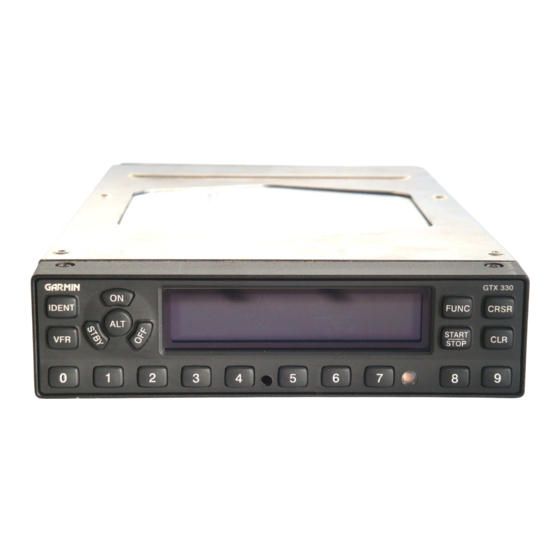Mode S Data Transmission
In additlon ro 4096 code and pressure altitude, the GTX 330 is capable of transmittrng arr-
craft ldentification, transponder capability and maximum speed range. "Aircraft Identificatlon"
is commonly referred to as FLT lD (Flight ldentification). The GTX 330 may be configured
by the installer to a1low rhe flight clew to entel FLT lD for each flight. An example is when
arr-carrier service requires changing the FLT ID.
The FLT ID may consist of the aircraft registratlon or a flight number as agreed upon with
the local alration authorlty. In elther case, the FtT ID must be the same aircraft ldentification
that appears in the flighi plan to correlate the aircraft identification seen on ATC radar wlth the
correct voice call sign for the aircraft. If no flight plan is filed with the alratlon authority (as
may be permitted by regulations), the FLT ID entered is the aircraft registration marking.
When flight crew entry of the FLT ID is not requlred, the installer configures the syslem
to report the aircraft identification accordrng to 1oca1 aviatlon requirements. In thls configura-
tion, alteratron of the FLT ID by the flight crew is not posslble.
Entering a Flight lD Number
When configured for FLT ID PWR-UP ENTRY at installation, the flight crew musr enrer
t h e f l i g h t l D b e f o r e r h e C T X l l 0 w r l l o p e r a l e . A l t e r t h e [ 1 i g h t c r e w e n l e r s r h e c o r r e c r F l i g h r
ID, the aircraft identrfication that is transmitted in response to ATC radar interrogations is
properly correlated wrth the associated call sign for voice communication with the aircraft.
If the FLT ID PWR-UP ENTRY is required but does nor appear ar power up, conracr a
Garmin authorized service center for GTX 330 configurarion.
\o space is needed when enrering Flight tD characrers.
\Ä hen a Flighr lD conLains
a
space, the GTX 330 automatically
removes the spaces upon completion of Flight ID entry
At system power-up rhe FLT ID may
appear with no number (as shown) or with the
last FLT ID entered. The cursor may cover the
whole FLT ID or may be on the first character
space for data entry, dependlng on how the FLT ID was last eniered
l l r h e F I i o h r l f ) r n n e r r i n o , l r r r r n - n n i q
correct, press the CRSR key to move the cursor
to the "OK?" field. Press CRSR again to accept
r h e F L T l D . T h e t r a n s p o n d e r
t h e n b e g r n s
n n r m q l n n e r r t i n n
When no FLT ID appears or the FLT ID must be changed, press the CLR key ro begln
character entry
Press the number keys corresponding
ro the
alphanumeric
character
entry: For example. to
e n t e r t h e l e t t e r " R ' p r e s s t h e 5 k e y f o u r t i m e s .
E - . L r i * . - - ^ l - L - - . . * - , r i C C h a r a C t e r i S
L 4 l r r
L [ r r c a r r a r P r r 4 r r u r t L (
entered, press the CRSR key to move the cursor to the nexi blank fie1d. Pressing the CLR key
moves the cursor back to the previous character. After the complete FLT ID is entered, press
the CRSR key to move the cursor to the "OK?" freld Press CRSR again to accept the FLT ID
When FLT ID entry is complete the transponder begins normal operarion.
If you make an error entering a FLT ID, you can press the CLR key to back up to any
point, including highlighting the "OK?'' fre1d. If an incorrect FLI ID is discovered after the
unit begins operation, turn the GTX 330 off. Then turn it back on again and reenter the cor-
rCCI FLI ID.

